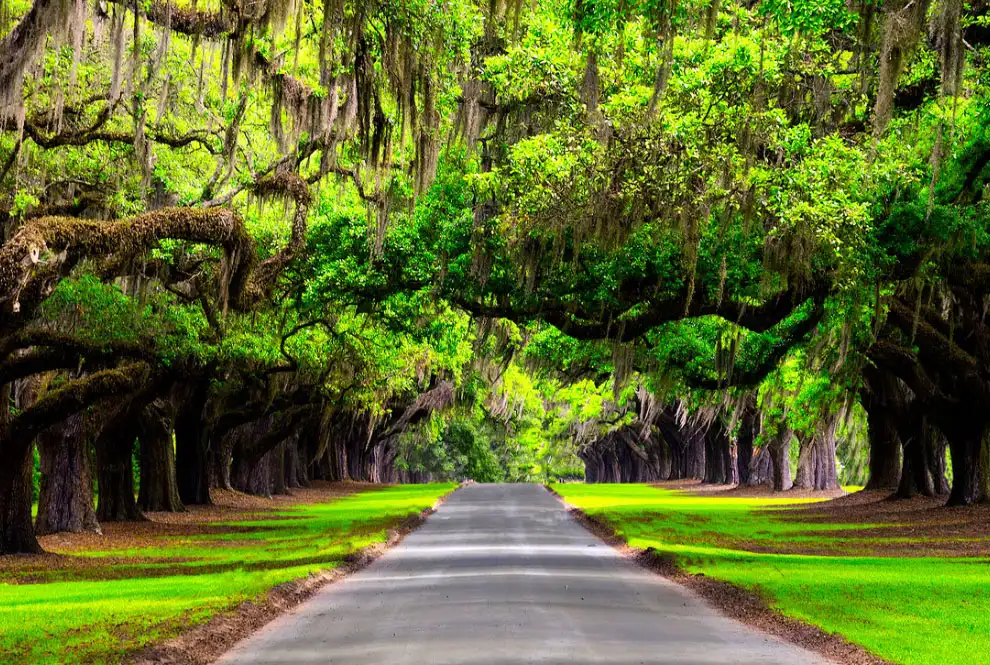Charleston, South Carolina, is home to several historic plantations that showcase the region’s rich history and stunning landscapes. Many of these plantations are open to the public for tours and special events, offering visitors a glimpse into the past. Here are some famous plantations in the Charleston area.
Magnolia Plantation and Gardens
is a historical treasure located in Charleston, South Carolina, founded in 1676 along the picturesque Ashley River. As America’s oldest public gardens, Magnolia boasts an enchanting landscape filled with vibrant blooms, centuries-old trees, and serene water features. Visitors can explore the meticulously designed gardens, which showcase a diverse array of plant species and provide a haven for local wildlife. The plantation also features a beautifully preserved house that offers guided tours, allowing guests to delve into the rich history of the property and its inhabitants.
Middleton Place
nestled along the banks of the Ashley River in Charleston, South Carolina, is a National Historic Landmark that invites visitors to step back in time and explore the region’s rich history. Established in the 18th century, this former rice plantation boasts America’s oldest landscaped gardens, where guests can wander through meticulously designed pathways, admire stunning floral displays, and enjoy the serene atmosphere. The beautifully restored plantation house showcases period furnishings and family heirlooms, providing a glimpse into the lives of its past inhabitants. A visit to Middleton Place promises an immersive experience that blends the charm of Southern elegance with the captivating stories of Charleston’s past.
Drayton Hall
a stunning architectural gem nestled along the Ashley River in Charleston, South Carolina, holds the distinction of being the oldest preserved plantation house in America open to the public. Built in 1738, this Georgian-Palladian masterpiece showcases its era’s timeless beauty and craftsmanship. The unaltered structure of the mansion offers a unique window into the past, with its original woodwork, ornate plaster ceilings, and distinctive design elements. Drayton Hall stands as an enduring testament to Charleston’s storied heritage and a must-visit destination for history enthusiasts and architectural lovers alike.
Boone Hall Plantation & Gardens
is a historic gem located in Mount Pleasant, just outside Charleston, South Carolina. Established in 1681, this picturesque plantation is renowned for its breathtaking Avenue of Oaks, which creates a stunning canopy leading to the beautifully restored main house. The vibrant gardens showcase an array of colorful blooms and provide a serene setting to explore and unwind. In addition, the plantation features original slave cabins, now preserved as a poignant exhibit that sheds light on the Gullah culture and the African American experience in the Lowcountry. Boone Hall Plantation & Gardens promises a captivating experience that combines Southern charm, natural beauty, and a deep connection to Charleston’s storied past.
McLeod Plantation Historic Site
located on James Island near Charleston, South Carolina, is a 37-acre property that offers visitors an opportunity to delve into the complex history of the Lowcountry. Established in 1851, this former Sea Island cotton plantation has been meticulously preserved to reflect its past while providing valuable insights into the lives of both the plantation owners and the enslaved people who lived and worked there.
More Than Just Beautiful Sights
The plantations in Charleston, South Carolina, offer a unique window into the past. They provide first-hand knowledge of the region’s history, shedding light on the lives of the people who once inhabited them, whether free or enslaved. Exploring these sites allows visitors to deepen their understanding of the Lowcountry’s complex history, admire architectural and horticultural marvels, and celebrate the contributions of diverse cultures to Charleston’s rich heritage. By preserving these vital links to our past and sharing them with visitors, we can reflect on the cultural heritage and appreciate the resilience of those who have contributed to shaping it. Ultimately, these plantations are more than just beautiful and fascinating destinations. These plantations provide visitors with an opportunity to learn about Charleston’s history, explore beautiful gardens, and gain insight into the lives of those who once lived and worked on these historic properties.





